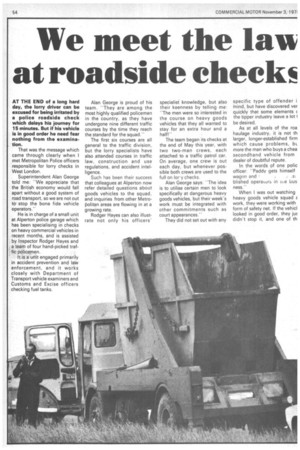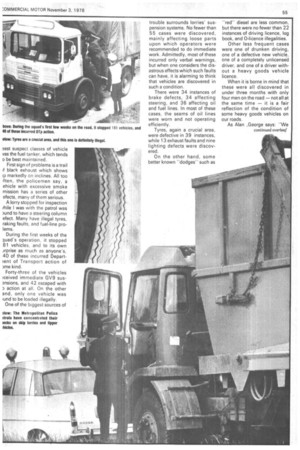We meet the Mu at roadside cheeks
Page 56

Page 57

If you've noticed an error in this article please click here to report it so we can fix it.
AT THE END of a long hard day, the lorry driver can be excused for being irritated by a police roadside check which delays his journey for 15 minutes. But if his vehicle is in good order he need fear nothing from the examination.
That was the message which came through clearly when l met Metropolitan Police officers responsible for lorry checks in West London.
Superintendent Alan George told me: We appreciate that the British economy would fall apart without a good system of road transport, so we are not out to stop the bona fide vehicle operators.'' He is in charge of a small unit at Alperton police garage which has been specialising in checks on heavy commercial vehicles in recent months, and is assisted by Inspector Rodger Hayes and a team of four hand-picked traffic policemen.
It is a unit engaged primarily in accident prevention and law enforcement, and it works closely with Department of Transport vehicle examiners and Customs and Excise officers checking fuel tanks. Alan George is proud of his team. "They are among the most highly qualified policemen in the country, as they have undergone nine different traffic courses by the time they reach the standard for the squad."
The first six courses are all general to the traffic division, but the lorry specialists have also attended courses in traffic law, construction and use regulations, and accident intelligence.
Such has been their success that colleagues at Alperton now refer detailed questions about goods vehicles to the squad, and inquiries from other Metroriolitan areas are flowing in at a growing rate.
Rodger Hayes can also illustrate not only his officers' specialist knowledge, but also their keenness by telling me: "The men were so interested in the course on heavy goods vehicles that they all wanted to stay for an extra hour and a half!"
The team began its checks at the end of May this year, with two two-man crews, each attached to a traffic patrol car. On average, one crew is out each day, but whenever possible both crews are used to the full on lory checks.
Alan George says. "The idea is to utilise certain men to look specifically at dangerous heavy goods vehicles, but their week's work must be integrated with other commitments such as court appearances."
They did not set out with any specific type of offender i 'mind, but have discovered ver quickly that some elements the tipper industry leave a lot I be desired.
As at all levels of the roa haulage industry, it is not th larger, longer-established firm which cause problems, loi more the man who buys a chea secondhand vehicle from dealer of doubtful repute.
In the words of one polic officer, "Paddy gets himself wagon and 2 blished opera iurs in lie bus ness,"
When I was out watching heavy goods vehicle squad E work, they were working with form of safety net. If the vehicl looked in good order, they juE. didn't stop it, and one of th
east suspect classes of vehicle vas the fuel tanker, which tends o be best maintained.
First sign of problems is a trail 1 black exhaust which shows ip markedly on inclines. All too .ften, the policemen say, a ehicle with excessive smoke mission has a series of other efects, many of them serious.
A lorry stopped for inspection rhile I was with the patrol was aund to have a steering column efect. Many have illegal tyres, raking faults, and fuel-line prolems.
During the first weeks of the quad's operation, it stopped 81 vehicles, and to its own J r pri se as much as anyone's, 40 of these incurred Departlent of Transport action of )me kind.
Forty-three of the vehicles :ceived immediate GV9 susansions, and 42 escaped with a action at all. On the other and, only one vehicle was ,und to be loaded illegally.
One of the biggest sources of trouble surrounds lorries' suspension systems. No fewer than 55 cases were discovered, mainly affecting loose parts upon which operators were recommended to do immediate work. Admittedly, most of these incurred only verbal warnings, but when one considers the disastrous effects which such faults can have, it is alarming to think that vehicles are discovered in such a condition.
There were 34 instances of brake defects, 34 affecting steering, and 36 affecting oil and fuel lines. In most of these cases, the seams of oil lines were worn and not operating efficiently.
Tyres, again a crucial area, were defective in 39 instances, while 13 exhaust faults and nine lighting defects were discovered.
On the other hand, some better known "dodges" such as
"red" diesel are less common, but there were no fewer than 22 instances of driving licence, log book, and 0-licence illegalities.
Other less frequent cases were one of drunken driving, one of a defective new vehicle, one of a completely unlicensed driver, and one of a driver without a heavy goods vehicle licence.
When it is borne in mind that these were all discovered in under three months with only four men on the road — not all at the same time — it is a fair reflection of the condition of some heavy goods vehicles on our roads.
As Alan ,George says: "We continued overleaf




























































































































